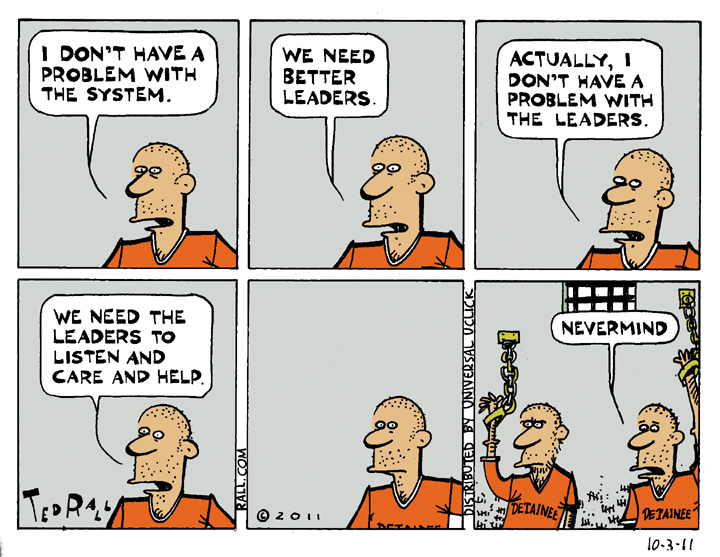Obama Accepts 21st Century View of Gay Marriage
In the BDSM world the phrase “topping from the bottom” means conditional submission: when the sub questions or disobeys the instructions of his or her dom. Subverting the submissive role defeats the whole purpose of a BDSM relationship; it is thus frowned upon.
President Obama frequently engages in the political equivalent: leading from the back.
True leaders lead. They declare what society needs and tells it what it should want. Leaders anticipate what is possible. They open the space where long-held dreams intersect with current reality, allowing progress. “Do not go where the path may lead; go instead where there is no path and leave a trail,” Emerson advised.
The role of a leader has been clearly defined since the first time a member of a clan convinced his tribe they should follow him if they wanted to find more food. So why has it been so long since we Americans had real one?
In recent decades we have had two kinds of political leaders, bullies and followers. Beginning with Nixon but more so with Reagan and George W. Bush, Republican presidents have been bullies. Unwilling or unable to achieve the consensus of the majority for their radical agendas, they got what they wanted by any means necessary—corrupting the electoral process, lying, smearing opponents, and fear-mongering.
The Democrats—Carter, Clinton, and Obama—have been followers, and thus far less effectual. Leaders from the back.
Carter was the proto-triangulator, tacking right as a hawk on the Soviet invasion of Afghanistan and the Iran hostage crisis, while ignoring his liberal supporters. Clinton famously relied on toe-sucking Machiavellian pollster Dick Morris to develop stances and market memes that synced up exactly with public opinion on micro mini wedge issues. Both men left office without any major accomplishments—unless you count their sellouts to the Right (beginning “Reagan”‘s defense build-up, NAFTA, welfare reform).
Obama’s decision to come out in favor of gay marriage is classic Morris-style “leading from the back.”
“Public support for same-sex marriage is growing at a pace that surprises even professional pollsters as older generations of voters who tend to be strongly opposed are supplanted by younger ones who are just as strongly in favor,” notes The New York Times. “Same-sex couples are featured in some of the most popular shows on television, without controversy.”
No wonder: the latest Pew Research poll shows that 47 percent of voters support gay marriage, versus 43 percent against. (Among swing voters—of more interest to the Obama campaign—support is 47-to-39 percent in favor.)
“I believe marriage is between a man and a woman. I am not in favor of gay marriage,” Obama said days before the 2008 election. At that time, Americans were running 40-to-56 percent against allowing same-sex couples to wed.
I can’t read his mind, but I bet Obama was OK with gay marriage in 2008. Like most other educated people. Cynically and wrongly, he sided with anti-gay bigots because he thought it would help him win.
The president’s change of ideological heart was painfully awkward. “I have hesitated on gay marriage in part because I thought that civil unions would be sufficient,” he told ABC. “I was sensitive to the fact that for a lot of people the word ‘marriage’ was something that invokes very powerful traditions, religious beliefs and so forth.”
But now that’s changed, he said. “It is important for me personally to go ahead and affirm that same-sex couples should be able to get married.”
If Obama was a real leader, he wouldn’t care about offending “a lot of people”—i.e., right-wing homophobes. He would have gotten out front of the issue four years ago, when it mattered. The truth is, Vice President Joe Biden’s unscripted remarks a few days ago forced the issue.
Maybe Biden has the makings of a leader.
Six states and the District of Columbia have legalized gay weddings. True, the president’s statement may hasten the demise of the vile Defense of Marriage Act, which blocks federal recognition of gay marriage (and which Obama’s Justice Department defended in June 2009). But it comes too late to be meaningful.
Gay marriage was a historical inevitability before Obama spoke.
That hasn’t changed.
“For thousands of supporters who donated, canvassed and phone-banked to help elect Barack Obama, this is a powerful reminder of why we felt so passionately about this president in the first place,” said Michael Keegan, president of People for the American Way, a pro-Democratic Party interest group.
Maybe so. I don’t see it that way. I see a nation that led itself on this issue. The public debated and thought and finally, at long last, concluded that gays and lesbians deserve equal treatment before the law.
Obama didn’t lead us. We led him.
So tell me—what good is he, exactly?
(Ted Rall’s next book is “The Book of Obama: How We Went From Hope and Change to the Age of Revolt,” out May 22. His website is tedrall.com.)

